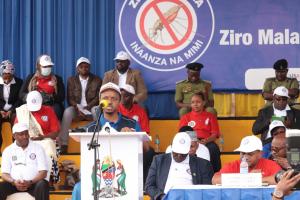Tanzania to ensure every Malaria case is reported and investigated promptly
25 April 2021, Arusha: Tanzania has launched a new intervention aiming to eliminate malaria in locations with low risk of malaria. Malaria Case Based Surveillance (mCBS) was launched by the Minister of Health Community Development, Gender, Elderly and Children, Dr. Dorthy Gwajima in Arusha during the commemoration of the World Malaria Day 2021.
The new initiative will be implemented in low malaria risk regions, Arusha, Kilimanjaro and Manyara in the first phase, then considered for expansion to Njombe and Iringa. According to the national stratification of malaria risk in Tanzania the five regions’ malaria risk is below one percent.
Because of the stratification, now Tanzania has an option to pinpoint specific interventions for an area based on the need, practicality and impact.
“This intervention is in the national malaria strategic plan 2021-2025 that emphasizes deploying interventions based on information about the level of malaria risk in a particular area,” said Dr. Gwajima.
The WHO Country Office provided technical support in different stages of the establishment of mCSB including development of a protocol and training manual and tools for sub-national level personnel and facilitation in the training of Regional and Council Health Management teams and health facilities in the three regions.
In this intervention health officials at district level will be automatically alerted once the health information records a new case of malaria. Then a team is dispatched to the household to record the patient history and determine whether the infection was acquired locally or outside the low risk area, for instance after travelling to a known malarious location.
Once the field team determines how the patient contacted malaria mosquitoes’ decisions will be made about how to control mosquitoes in the household and the neighbourhood and arrest further the spread of malaria infection to the family and neighbours.
With Tanzania among eleven countries that contribute an estimated 70 percent of the global malaria cases and 71 percent malaria deaths, intensification of malaria control interventions is crucial for the country to attain sustainable development goal three on health.
The mCBS will also contribute to Tanzania’s effort to get back on track towards Global Technical Strategy (2016-2030) milestone of reducing malaria by 90 percent by 2030.
The Minister of Health also launched a protocol that will guide implementation of the mCBS and challenged district councils in high malaria risk areas to procure biological larvicides, currently produced in Tanzania.
The WHO Country Representative, Dr. Tigest Ketsela Mengestu, commended the tailoring of malaria intervention based on malaria transmission risk. “Using a country-led data-driven approach, now Tanzania can tailor intervention approaches to the sub-national local context thus accelerating progress against malaria.”




